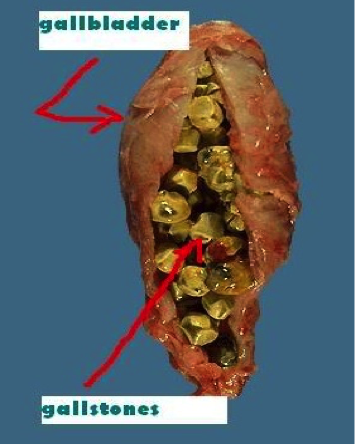Gallstones are small stones, usually made of cholesterol, that form in the gallbladder. In most cases they don’t cause any symptoms and don’t need to be treated.
However, if a gallstone becomes trapped in a duct (opening) inside the gallbladder it can trigger a sudden intense abdominal pain that usually lasts between one and five hours. This type of abdominal pain is known as biliary colic.
Some people with gallstones can also develop complications, such as inflammation of the gallbladder (cholecystitis), which can cause:
When gallstones cause symptoms or complications, it is known as gallstone disease or cholelithiasis.
|
 |
The gallbladder
The gallbladder is a small, pouch-like organ found underneath the liver. Its main purpose is to store and concentrate bile.
Bile is a liquid produced by the liver to help digest fats. It’s passed from the liver through a series of channels, known as bile ducts, into the gallbladder.
The bile is stored in the gallbladder and over time it becomes more concentrated, which makes it better at digesting fats. The gallbladder releases bile into the digestive system when it’s needed.
Causes of gallstones
Gallstones are thought to be caused by an imbalance in the chemical make-up of bile inside the gallbladder. Bile is a liquid produced by the liver to aid digestion.
It’s still unclear exactly what leads to this imbalance, but gallstones can form if:
- there are unusually high levels of cholesterol inside the gallbladder (about four in every five gallstones are made up of cholesterol)
- there are unusually high levels of a waste product called bilirubin inside the gallbladder (about one in every five gallstones is made up of bilirubin)
These chemical imbalances cause tiny crystals to develop in the bile. These can gradually grow (often over many years) into solid stones that can be as small as a grain of sand or as large as a pebble.
Sometimes only one stone will form, but there are often several at the same time.
Gallstones are very common. You’re more at risk of developing gallstones if you’re:
- overweight or obese
- female, particularly if you’ve had children
- 40 or over (the risk increases as you get older)
Treating gallstones
Treatment is usually only necessary if gallstones are causing:
- symptoms – such as abdominal pain
- complications – such as jaundice or acute pancreatitis
In these cases, keyhole surgery to remove the gallbladder may be recommended. This procedure, known as a laparoscopic cholecystectomy, is relatively simple to perform and has a low risk of complications.
You can lead a perfectly normal life without a gallbladder. Your liver will still produce bile to digest food, but the bile will just drip continuously into the small intestine, rather than build up in the gallbladder.
Who’s at risk?
Gallstones are more common if you:
- are female, particularly if you’ve had children, are taking the combined Pill, or are undergoing high-dose oestrogen therapy
- are overweight or obese
- are aged 40 years or older (the older you are, the more likely you are to develop gallstones)
- have a condition that affects the flow of bile – such as cirrhosis (scarring of the liver), primary sclerosing cholangitis, or obstetric cholestasis
- have Crohn’s disease or irritable bowel syndrome(IBS)
- have a close family member who’s also had gallstones
- have recently lost weight (from either dieting or weight-loss surgery)
Preventing gallstones
From the limited evidence available, changes to your diet and losing weight (if you’re overweight) may help prevent gallstones.
Diet
Because of the role cholesterol appears to play in the formation of gallstones, it is advisable to avoid eating too many fatty foods with high cholesterol content.
A healthy, balanced diet is recommended which includes plenty of fresh fruits, vegetables and whole grains.
There’s also evidence that regularly eating nuts, such as peanuts or cashews, can help reduce your risk of developing gallstones.
Losing weight
Being overweight, particularly being obese, increases the amount of cholesterol in your bile, which increases your risk of developing gallstones. You should control your weight by eating a healthy diet and regular exercise.



2 Comments
Like!! Thank you for publishing this awesome article.
Thanks. Glad that you liked it. Keep reading and posting your views on other articles too. Feel free to share with your friends.